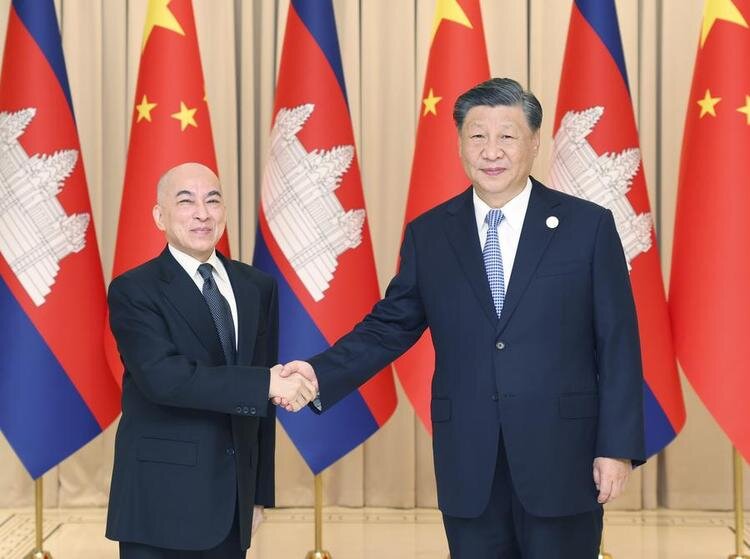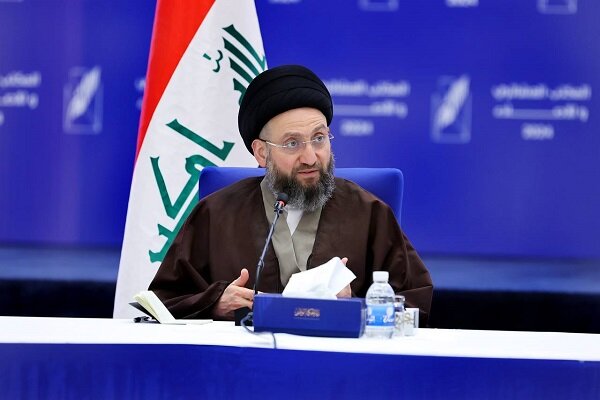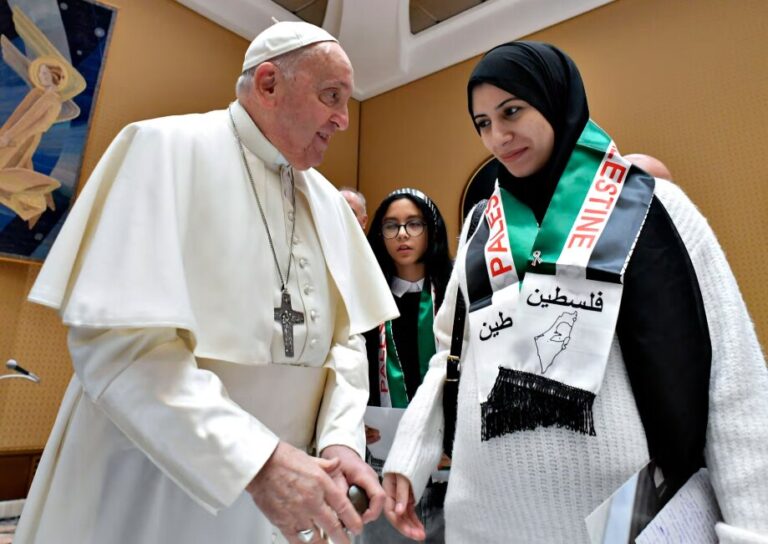Xi Jinping’s Unbreakable Alliance: Strengthening Ties with Cambodia’s Ironclad Partners
In February 2023, Chinese President Xi Jinping hosted former Cambodian Prime Minister Samdech Techo Hun Sen at the Diaoyutai State Guest House in Beijing. This meeting was a significant moment between two longstanding friends, as reported by the Xinhua news agency. The relationship between China and Cambodia has evolved over the years, reflecting a strong commitment to mutual support and cooperation.
Back in early 2020, Hun Sen had visited Beijing during the COVID-19 pandemic to express Cambodia’s unwavering support for China at a challenging time. Three years later, Hun Sen returned to China, keeping his word to strengthen the ties between their nations.
During their 2023 meeting, Xi reminisced about Hun Sen’s visit during a heavy snowfall, expressing his happiness to honor the “three-year appointment” with the visiting Cambodian leader. The strong friendship between Xi and Hun Sen symbolizes the enduring bond between China and Cambodia, meticulously nurtured by generations of leaders from both countries.
A Chair of Unique Friendship
On the day Xi arrived in Cambodia’s capital, Phnom Penh, for a state visit in 2016, he made a special trip to the royal palace to meet with Queen Mother Norodom Monineath Sihanouk. The queen mother graciously invited Xi to sit in a chair that had been preserved since the passing of her late husband, King Father Norodom Sihanouk. This chair had remained untouched, symbolizing a deep respect and honor.
Princess Norodom Arunrasmy, who was present during this visit, explained, “This is a privilege reserved only for the most esteemed and dearest friends.” Xi expressed fond memories of King Father Sihanouk, calling him “a revered friend of the Chinese people and a symbol of China-Cambodia friendship.” The king’s longstanding personal connections with Chinese leaders since the 1950s have significantly contributed to the strengthening of relations between the two nations.
Xi has often quoted a traditional Chinese saying to emphasize the resilience of the China-Cambodia friendship: “A long journey tests a horse’s strength, and a long span of time reveals a person’s heart.” In an article published by Cambodian media prior to his 2016 visit, Xi acknowledged Cambodia’s early recognition of the People’s Republic of China and its support for China at the United Nations.
Over the years, the friendship has flourished. China has consistently supported Cambodia in its national independence and economic development, including significant projects like the construction of Cambodia’s first cement plant and thermal power station. To honor this relationship, Xi awarded a Friendship Medal to Queen Mother Monineath in November 2020, stating, “This weighty ‘Friendship Medal’ represents the deep respect of the Chinese people for Queen Mother Monineath and the profound friendship between China and Cambodia.”
Continuity in Leadership
Xi has shown particular regard for Cambodia’s royal family, welcoming them warmly during his meetings. “Beijing is your home. You’re more than welcome to return whenever you like,” he remarked during a meeting with King Sihamoni and Queen Mother Monineath in 2014. Over the past decade, the royal family has made frequent trips to China for medical check-ups and other engagements.
With the transition of power to Hun Manet as Cambodia’s new prime minister, the friendship between the two nations continues to thrive. Hun Manet selected China as his first official overseas destination after taking office in September 2023, emphasizing Cambodia’s diplomatic priorities. During his meeting with Xi, Hun Manet committed to further enhancing the enduring friendship between Cambodia and China.
Ek Sam Ol, president of the Cambodia-China Friendship Association, noted that the relationship between the two countries serves as a model for how nations, regardless of size, can interact with mutual respect, equality, and cooperation. This partnership has played a crucial role in maintaining regional peace and stability, yielding significant benefits for both nations’ citizens.
A Road to Hope
A Cambodian proverb states, “Where there is a road, there is hope.” In May 2024, a road in Phnom Penh was named “Xi Jinping Boulevard” to honor President Xi’s contributions to Cambodia’s development. This act symbolizes the deepening ties between China and Cambodia, as Hun Manet remarked that their bilateral relationship is currently at its best.
Since 2013, the comprehensive strategic cooperative partnership between China and Cambodia has strengthened through practical cooperation across various sectors. The Belt and Road Initiative (BRI), introduced by Xi, has significantly contributed to mutual development and benefits. As a key player along the ancient Maritime Silk Road, Cambodia was one of the first countries to engage in Belt and Road cooperation, with its leadership actively participating in multiple forums in China.
Notable BRI projects have yielded remarkable results in Cambodia, such as:
- The Sihanoukville Special Economic Zone (SSEZ), which has attracted over 200 international enterprises, creating approximately 32,000 jobs.
- The Phnom Penh-Sihanoukville Expressway, which has dramatically reduced travel time between these cities from over five hours to less than two.
- The Siem Reap Angkor International Airport, facilitating significant growth in the tourism sector with 17 operational routes by the end of last year.
These initiatives are vital for Cambodia’s ambition to become an upper-middle-income country by 2030 and a high-income country by 2050. Neak Chandarith, director of the Cambodia 21st Century Maritime Silk Road Research Center, emphasized that key BRI projects have been instrumental in achieving these goals.
Bilateral trade between China and Cambodia has also seen substantial growth. China has consistently been Cambodia’s largest foreign investor and trading partner. Over the past decade, trade has nearly quadrupled, aided by the Cambodia-China Free Trade Agreement and the Regional Comprehensive Economic Partnership, which have facilitated the export of Cambodian products such as rice and bananas to Chinese markets.
Xi Jinping has continuously advocated for a comprehensive approach to cooperation, reiterating the importance of the bilateral “Diamond Hexagon” cooperation framework, which encompasses six critical areas: politics, production capacity, agriculture, energy, security, and people-to-people exchanges. These efforts provide new momentum for building a high-quality, high-level, and high-standard community with a shared future between China and Cambodia.
Sharing Valuable Insights
In April 2017, the Khmer edition of “Xi Jinping: The Governance of China” was launched in Cambodia, with Hun Sen in attendance. This book compiles speeches, addresses, and messages from Xi, providing insights into his governance philosophies.
Hun Sen expressed hope that Cambodian officials, scholars, and students would benefit from the book, applying its insights to Cambodia’s unique circumstances. Chea Munyrith, president of the Cambodian Chinese Evolution Researcher Association, led the translation team and highlighted the relevance of China’s experiences reflected in Xi’s work to Cambodia’s development.
One notable section of the book discusses poverty alleviation strategies. Under Xi’s leadership, China achieved the remarkable feat of eliminating absolute poverty in 2020, meeting the United Nations’ 2030 Agenda target a decade early. Cambodian officials are particularly focused on poverty alleviation, closely following China’s governance experiences in this domain.
Concrete steps in poverty reduction cooperation have led to the establishment of demonstration villages in Cambodia, with China sharing effective strategies in modern agriculture and rural development. As a result, infrastructure such as roads, canals, solar-powered lamps, and clean water facilities have transformed rural communities.
According to the UNDP Country Programme Document 2024-2028, Cambodia has lifted approximately 2.8 million people out of poverty in the last seven and a half years. Xi’s support remains crucial as Cambodia seeks to identify a development path tailored to its needs, a principle central to China’s remarkable economic growth and social stability.
Hun Sen regards Xi as a visionary leader whose initiatives, such as the Belt and Road Initiative, reflect a profound understanding of global dynamics. “Tell me, which other leader possesses such foresight?” he asked, highlighting the importance of Xi’s leadership in guiding China’s development.






